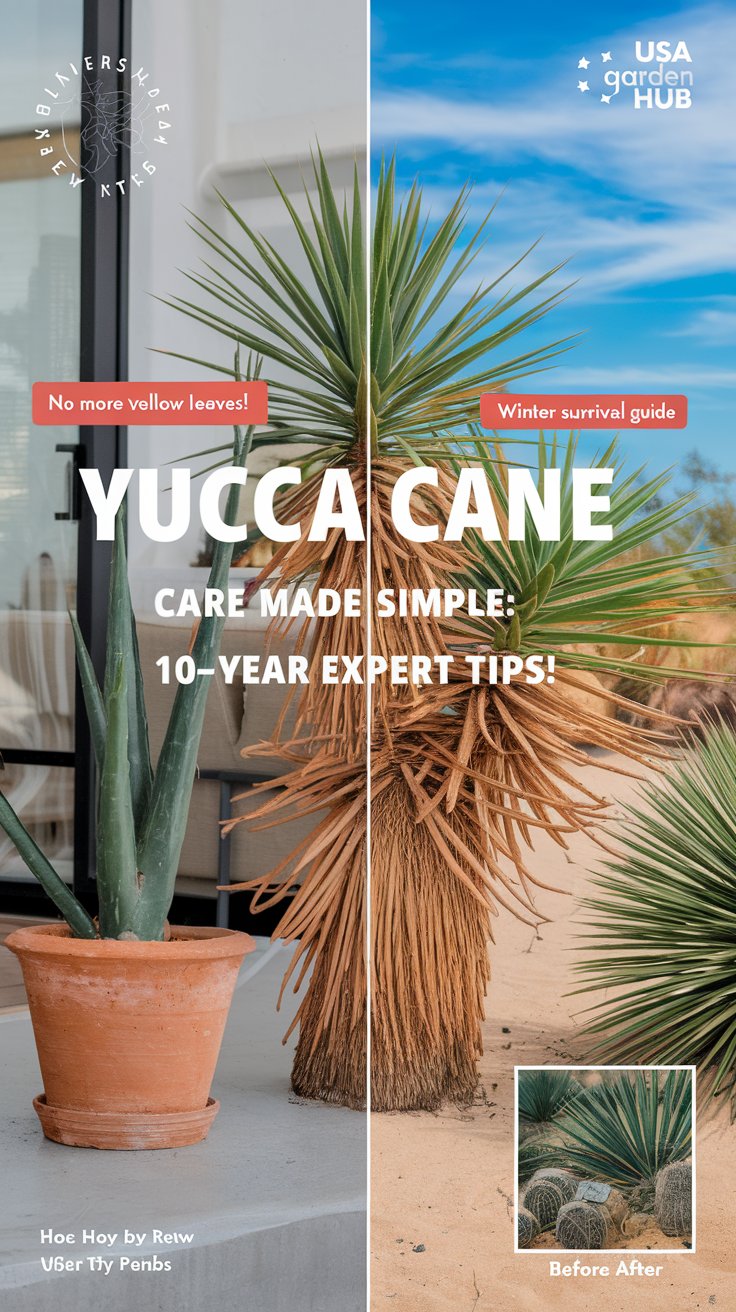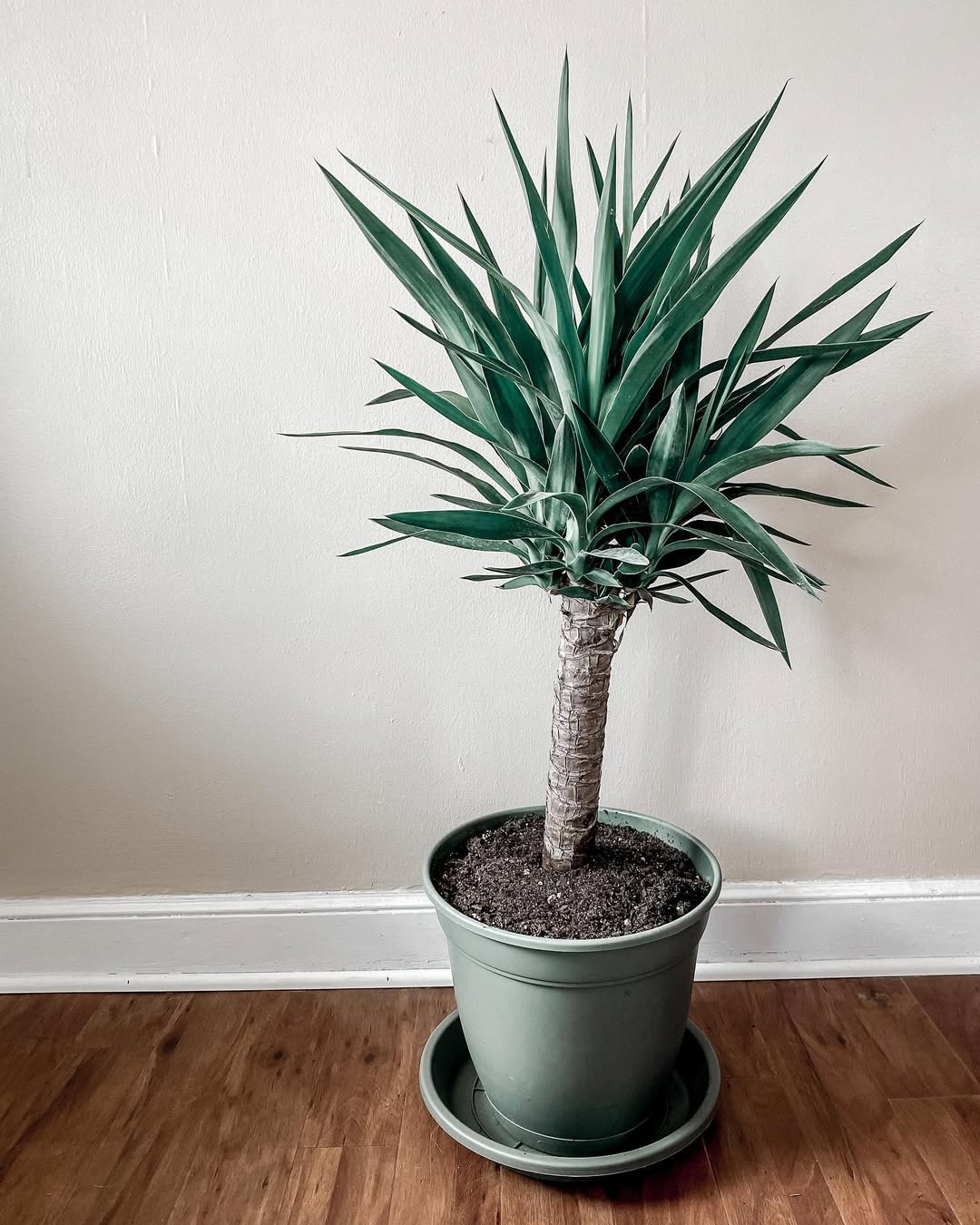Learn how to care for yucca canes indoors and outdoors with my decade-tested tips. Solve common problems, master winter care, and enjoy your plant’s benefits!

Hi there! I’m Ashley Scott, founder of USA Garden Hub and a gardening enthusiast with over 10 years of hands-on experience. If you’ve ever wondered why your yucca cane’s leaves are turning yellow or how to keep it thriving through winter, you’re in the right place. Let me share my tried-and-true methods for nurturing these resilient, striking plants—whether they’re in your living room or backyard.
Why Yucca Canes Are a Gardener’s Best Friend

I’ll never forget my first yucca cane. I bought it on a whim at a local nursery, drawn by its sword-like leaves and tropical vibe. Fast-forward a decade, and I’ve propagated dozens of these hardy plants for friends, family, and my own home. Here’s why they’re worth the hype:
- Low maintenance: Perfect for busy plant parents.
- Air-purifying: NASA’s Clean Air Study lists yuccas as natural air filters.
- Adaptable: Thrives indoors and outdoors in zones 4-11.
Let’s dive into the care secrets that keep yuccas happy year-round.
Yucca Cane Basics: Light, Water, Soil & Temperature
1. Light Requirements: Sun Worshipers Unite!
Yuccas crave bright, indirect light. I keep mine near east-facing windows where they get morning sun. If your leaves look pale or stretched (a problem I faced in my first apartment), move the plant closer to light.
Pro Tip: Outdoor yuccas love full sun but acclimate them gradually to avoid scorching.
2. Watering: Less Is More
Overwatering is the #1 killer of yucca canes. I water mine every 2-3 weeks in summer and monthly in winter. Use the “finger test”: if the top 2 inches of soil are dry, it’s time to water.
My Mistake to Avoid: In 2018, I nearly lost a yucca to root rot after weekly watering. Let the soil dry completely between sessions!
3. Soil & Potting Mix
Yuccas need well-draining soil. I mix 2 parts cactus soil with 1 part perlite. For potted plants, ensure your container has drainage holes.
Recommended Resource: The University of Florida’s guide to sandy soils explains why fast-draining mixes work best.
4. Temperature & Humidity
Keep indoor yuccas between 60-80°F. They tolerate dry air but appreciate occasional misting. Outdoor plants can handle temps as low as 30°F briefly.
Indoor vs. Outdoor Yucca Care: Key Differences
Caring for Indoor Yucca Canes
- Rotate pots monthly for even growth.
- Wipe leaves with a damp cloth to remove dust (I do this every Sunday!).
- Watch for pests like spider mites. My go-to fix: neem oil spray.
Outdoor Yucca Care
- Plant in raised beds if your soil is clay-heavy.
- Mulch around the base to retain moisture in summer.
- Protect from frost with burlap wraps in winter (more on this below).
Common Yucca Cane Problems (And How to Fix Them)
Yellow Leaves
Usually caused by overwatering or poor drainage. Check roots for rot and repot in dry soil if needed.
Brown Leaf Tips
Low humidity or fluoride in tap water. I use filtered water and trim brown edges with clean scissors.
Leggy Growth
Not enough light! Move the plant closer to a window or supplement with a grow light.
Visual Help: Compare your plant to The Spruce’s yucca problem photos.
How to Prune an Indoor Yucca Plant
Pruning keeps your yucca compact and healthy. Here’s my method:
- Sterilize pruning shears with rubbing alcohol.
- Cut back overgrown stems to your desired height (new growth will sprout below the cut).
- Remove dead leaves at the base by gently pulling downward.
I pruned my office yucca last spring—it’s now twice as bushy!
Winter Care for Yucca Canes
Yuccas go dormant in winter. Adjust care with these steps:
- Reduce watering to once a month.
- Keep away from drafts near windows or vents.
- Hold off on fertilizing until spring.
Pro Tip: If you’re growing yuccas outdoors in cold zones, check out my Winter Plant Protection Guide for frost-proofing strategies.
Benefits of Indoor Yucca Plants
Beyond their beauty, yuccas:
- Remove toxins like formaldehyde from the air (EPA study).
- Boost humidity by releasing moisture.
- Survive neglect (perfect for frequent travelers!).
FAQs: Quick Yucca Care Solutions
Q: Can I propagate my yucca cane? A: Absolutely! I’ve rooted many cuttings in water. See my Propagation Tips for details.
Q: Why isn’t my yucca growing? A: It might need more light or a nutrient boost. Try a balanced fertilizer in spring.
Final Thoughts
Caring for yucca canes is simpler than you’d think—just mimic their native desert habitat. With the right light, minimal water, and occasional pruning, your plant will thrive for decades.
Got Questions? Drop them in the comments, or explore my Ultimate Houseplant Care Guide for more tips!
